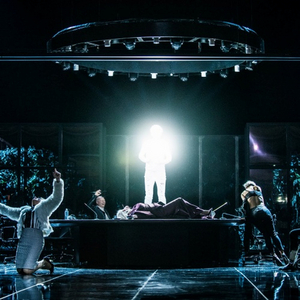KING ROGER Comes to the Polish National Opera in February
Performances run February 10-12.

King Roger comes to the Polish National Opera in February 2023. Performances run February 10-12.
Mariusz Treliński directed King Roger three times. The first time was in 2000 at the Grand Theater - National Opera under the baton of Jacek Kaspszyk, casting Wojciech Drabowicz in the title role. This staging evoked ancient rituals, symbols and archetypes, creating a mystical story about the conflict of cults - Christian and Dionysian, a new religion with an old one.
Seven years later, he directed Roger at the Wrocław Opera in cooperation with Ewa Michnik, where Andrzej Dobber played the main role. This time, Treliński made an interpretation in the spirit of modernity - it was about self-discovery and a mental crisis, helping Roger to discover the truth about himself, and then to see a change in his life based on the cult of power and violence. The shepherd was an outsider, a rebel, but also a seductive messenger of good news about a possible way out of the trap of a bad life.
After 18 years, the director returned to this title at the National Opera in co-production with the Royal Opera in Stockholm and Národní divadlo in Prague. According to Mariusz Treliński, King Roger is a complex and difficult work, but at the same time the most beautiful of all Polish pieces of music. Each new staging is like a journey, and Szymanowski's work is one of the milestones of contemporary thinking about opera.
King Roger is indeed a work with broad intellectual and artistic horizons, the aftermath of Karol Szymanowski's colorful journeys to the south of Europe and his interest in ancient and Arabian culture deepened by many readings. The exoticism of the Orient and the Dionysian myth, which absorbed him so much, also in the context of reading the works of Friedrich Nietzsche, merged in this opera.
In 1911, Szymanowski went to Sicily with a wealthy friend, Stefan Spiess, an industrialist and art lover. They returned there after three years, expanding the scope of the expedition to Algiers, Biskra and Tunis, and in 1917, 35-year-old Karol and his beloved cousin, poet and writer Jarosław Iwaszkiewicz, came up with the idea of creating a "Sicilian drama". Szymanowski was drawn to the opera, although his first attempt, the one-act play Hagith from 1914, a work with biblical and erotic themes, was not very successful - the composer did not manage to avoid mistakes typical of a debutante in this difficult musical and stage genre. And yet opera still tempted him: "Stage music is truly a magic agent," he believed.
The first sketches of King Roger were made in Elizawetgrad at the turn of 1917 and 1918, where Iwaszkiewicz stayed and where the Szymanowski family moved from Tymoszówka. Seeing the collapse of the world they knew, both artists sought refuge in a magical fiction created in their own imaginations.
Iwaszkiewicz completed the libretto in 1920, and Szymanowski added a lot to it, adding garlands of words. Work was slow for him because times had changed. The composer's thoughts were elsewhere - in the mountains, with the Podhale folklore, which he admired during his first stay in Zakopane in 1921. As if settling permanently in Poland, where he settled after the war, having abandoned the Ukrainian steppes where he grew up, and traveling to the South, woke him up from the oriental dream of his youth.
He completed the "Psiakrewska opera", as he called it at the time, in the summer of 1924, and it took him most of the time to orchestrate the whole, after all, not very extensive work. The premiere staging took place at the Grand Theater in Warsaw on June 19, 1926, conducted by Emil Młynarski, directed by Adolf Popławski, and designed by Wincenty Drabik. The premiere Roger was Eugeniusz Mossakowski, the Shepherd was Adam Dobosz. The composer's sister, Stanisława Szymanowska, played the role of the royal wife, Roxana.
King Roger closed the period in the work of Karol Szymanowski, funded by his fascination with antiquity and the Orient, during which such beautiful, sensual works were created, such as Love Songs by Hafiz , Myths for violin and piano, Symphony No. 3 "Song of the Night" to words by the Persian poet Rumi or the First Concerto violin . When Roger was played in Warsaw, its creator had already had Stabat Mater inspired by folk Catholicism and was thinking seriously about Harnasie . And yet, years later, he recognized King Rogerfor the best music ever written by him. In 1949, the work was staged in Sicily, in the Teatro Massimo towering over Palermo. This event was witnessed by Jarosław Iwaszkiewicz, who wrote that the performance directed by Bronisław Horowicz, Leon Schiller's student, "was close to perfection". However, to Iwaszkiewicz's daughter, who watched the performance with her father, the real Sicily seemed far removed from the dreamed-up, dreamed-up, mystical one presented by Karol Szymanowski in the opera. But it couldn't be otherwise. "King Roger's Sicily is the territory of the soul of the composer himself," admitted Jarosław Iwaszkiewicz in Meetings with Szymanowski.
King Roger's international renaissance came in 1998, when Simon Rattle, head of the City of Birmingham Symphony Orchestra, conducted Roger at the London Proms and recorded it in its entirety on EMI records. Since then, the "psyakrew opera" has been played, among others in in Paris, London, Madrid and Bilbao, Santa Fe, Frankfurt and Bregenz, in Sydney and Melbourne. Szymanowski would be pleased.
Opera in three acts
Libretto: Jarosław Iwaszkiewicz, Karol Szymanowski
Original Polish version with English subtitles
Performances are performed with the consent of Universal Edition AG.
The license for the production of the work was issued by the Association of Authors ZAiKS.
Premiere: 19/06/1926, Warsaw
Premiere of this staging: 2/12/2018, TW-ON
Co-produced by: Kungliga Operan, Národní divadlo
Strobe lights were used in the performance
The show is intended for adult audiences
Comments
Videos

